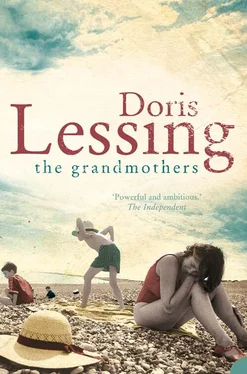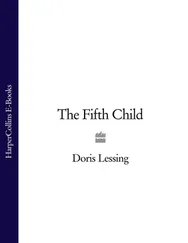Doris Lessing - The Grandmothers
Здесь есть возможность читать онлайн «Doris Lessing - The Grandmothers» — ознакомительный отрывок электронной книги совершенно бесплатно, а после прочтения отрывка купить полную версию. В некоторых случаях можно слушать аудио, скачать через торрент в формате fb2 и присутствует краткое содержание. Жанр: Старинная литература, на английском языке. Описание произведения, (предисловие) а так же отзывы посетителей доступны на портале библиотеки ЛибКат.
- Название:The Grandmothers
- Автор:
- Жанр:
- Год:неизвестен
- ISBN:нет данных
- Рейтинг книги:3 / 5. Голосов: 1
-
Избранное:Добавить в избранное
- Отзывы:
-
Ваша оценка:
- 60
- 1
- 2
- 3
- 4
- 5
The Grandmothers: краткое содержание, описание и аннотация
Предлагаем к чтению аннотацию, описание, краткое содержание или предисловие (зависит от того, что написал сам автор книги «The Grandmothers»). Если вы не нашли необходимую информацию о книге — напишите в комментариях, мы постараемся отыскать её.
The Grandmothers — читать онлайн ознакомительный отрывок
Ниже представлен текст книги, разбитый по страницам. Система сохранения места последней прочитанной страницы, позволяет с удобством читать онлайн бесплатно книгу «The Grandmothers», без необходимости каждый раз заново искать на чём Вы остановились. Поставьте закладку, и сможете в любой момент перейти на страницу, на которой закончили чтение.
Интервал:
Закладка:
Doris Lessing - The Grandmothers
Four Short Novels
CONTENTS
The Grandmothers
Victoria and the Staveney’s
The Reason for It
A Love Child
On either side of a little promontory loaded with cafés and restaurants was a frisky but decorous sea, nothing like the real ocean that roared and rumbled outside the gape of the enclosing bay and barrier rocks known by everyone - and it was even on the charts - as Baxter’s Teeth. Who was Baxter? A good question, often asked, and answered by a framed sheet of skilfully antiqued paper on the wall of the restaurant at the end of the promontory, the one in the best, highest and most prestigious position, Baxter’s, it was called, claiming that the inner room of thin brick and reed had been Bill Baxter’s shack, built by his own hands. He had been a restless voyager, a seaman who had chanced on this paradise of a bay with its little tongue of rocky land. Earlier versions of the tale hinted at pacific and welcoming natives. Where did the Teeth come into it? Baxter remained an inveterate explorer of nearby shores and islands, and then, having entrusted himself to a little leaf of a boat built out of driftwood and expertise, he was wrecked one moony night on those seven black rocks, well within the sight of his little house where a storm lantern, as reliable as a lighthouse, welcomed in ships small enough to get into the bay, having negotiated the reef.
Baxter’s was now well planted with big trees that sheltered tables and attendant chairs, and on three sides below was the friendly sea.
A path wandered up through shrubs, coming to a stop in Baxter’s Gardens, and one afternoon six people were making the gentle ascent, four adults and two little girls, whose shrieks of pleasure echoed the noises of the gulls.
Two handsome men came first, not young, but only malice could call them middle-aged. One limped. Then two as handsome women of about sixty - but no one would dream of calling them elderly. At a table evidently well-known to them, they deposited bags and wraps and toys, sleek and shining people, as they are who know how to use the sun. They arranged themselves, the women’s brown and silky legs ending in negligent sandals, their competent hands temporarily at rest. Women on one side, men on the other, the little girls fidgeting: six fair heads? Surely they were related? Those had to be the mothers of the men; they had to be their sons. The little girls, clamouring for the beach, which was down a rocky path, were told by their grandmothers, and then their fathers, to behave and play nicely. They squatted and made patterns with fingers and little sticks in the dust. Pretty little girls: so they should be with such good-looking progenitors.
From a window of Baxter’s a girl called to them, “The usual? Shall I bring your usual?’ One of the women waved to her, meaning yes. Soon appeared a tray where fresh fruit juices and wholemeal sandwiches asserted that these were people careful of their health.
Theresa, who had just taken her school-leaving exams, was on her year away from England, where she would be returning to university. This information had been offered months ago, and in return she was kept up to date with the progress of the little girls at their first school. Now she enquired how school was going along, and first one child and then the other piped up to say their school was cool. The pretty waitress ran back to her station inside Baxter’s with a smile at the two men which made the women smile at each other and then at their sons, one of whom, Tom, remarked, ‘But she’ll never make it back to Britain, all the boys are after her to stay.’
‘More fool her if she marries and throws all that away,’ said one of the women, - in fact Rozeanne, the mother of Tom. But the other woman, Lil (or Liliane), the mother of Ian, said, ‘Oh, I don’t know,’ and she was smiling at Tom. This concession, or compliment, to their, after all, claim to existence, made the men nod to each other, lips compressed, humorously, as at an often-heard exchange, or one like it.
‘Well; said Roz, ‘I don’t care, nineteen is too young.’
‘But who knows how it might turn out?’ enquired Lil, and blushed. Feeling her face hot she made a little grimace, which had the effect of making her seem naughty, or daring, and this was so far from her character that the others exchanged looks not to be explained so easily.
They all sighed, heard each other and now Laughed, a full frank laugh that seemed to acknowledge things unsaid. One little girl, Shirley, said, ‘What are you laughing at?’ and the other, Alice, ‘What’s so funny? I don’t see anything funny,’ and copied her grandmother’s look of conscious naughtiness, which in fact had not been intended. Lil was uncomfortable and blushed again.
Shirley persisted, wanting attention, ‘What’s the joke, daddy?’ and at this both daddies began a tussling and buffeting of their daughters, while the girls protested, and ducked, but came back for more, and then fled to their grandmothers’ arms and laps for protection. There they stayed, thumbs in their mouths, eyes drooping, yawning. It was a hot afternoon.
A scene of somnolence and satisfaction. At tables all around under the great trees similarly blessed people lazed. The seas all around them, only a few feet below, sighed and hissed and lapped, and the voices were low and lazy.
From the window of Baxter’s Theresa stood with a tray of cool drinks momentarily suspended and looked out at the family. Tears slid down her cheeks. She had been in love with Tom and then Ian, and then Tom again, for their looks and their ease, and something, an air of repletion, as if they had been soaking in pleasure all their lives and now gave it out in the form of invisible waves of contentment.
And then the way they handled the little girls, the ease and competence of that. And the way the grandmothers were always available, making the four the six … but where were the mothers, children had mothers, and these two little girls had Hannah and Mary, both startlingly unlike the blonde family they had married into, being small and dark, and, while pretty enough, Theresa knew neither of them was good enough for the men. They worked. They owned a business. That is why the grandmothers were so often here. Didn’t the grandmothers work, then? Yes, they did but were free to say, ‘Let’s go to Baxter’s‘ - and up here to Baxter’s they came. The mothers too, sometimes, and there were eight.
Theresa was in love with them all. She had at last understood it. The men, yes, her heart ached for them, but not too severely. What made the tears come was seeing them all there, watching them, as she did now. Behind her, at a table near the bar, was Derek, a young farmer who had wished to marry her. She didn’t mind him, rather fancied him, but she knew that this, the family, was the real passion.
Over deep layers of tree shadow lanced with sunlight, sun enclosed the tree, the hot blue air, interfused with bliss, happiness, seemed about to exude great drops of something like a golden dew, which only she could see. It was at that moment she decided she would marry her farmer and stay here, on this continent. She could not leave it for the fitful charms of England, of Bradford, though the moors did well enough, when the sun did decide to shine. No, she would stay here, she had to. ‘I want it, I want it,’ she told herself, allowing the tears at last to run freely. She wanted this physical ease, the calm of it, expressing itself in lazy movements, in long brown
legs and arms, and the glint of gold on fair heads where the sun had been.
Just as she claimed her future, she saw one of the mothers coming up the path. Mary - yes, it was. A little dark fidget of a woman, with nothing in her of the poise and style of The Family
Читать дальшеИнтервал:
Закладка:
Похожие книги на «The Grandmothers»
Представляем Вашему вниманию похожие книги на «The Grandmothers» списком для выбора. Мы отобрали схожую по названию и смыслу литературу в надежде предоставить читателям больше вариантов отыскать новые, интересные, ещё непрочитанные произведения.
Обсуждение, отзывы о книге «The Grandmothers» и просто собственные мнения читателей. Оставьте ваши комментарии, напишите, что Вы думаете о произведении, его смысле или главных героях. Укажите что конкретно понравилось, а что нет, и почему Вы так считаете.












